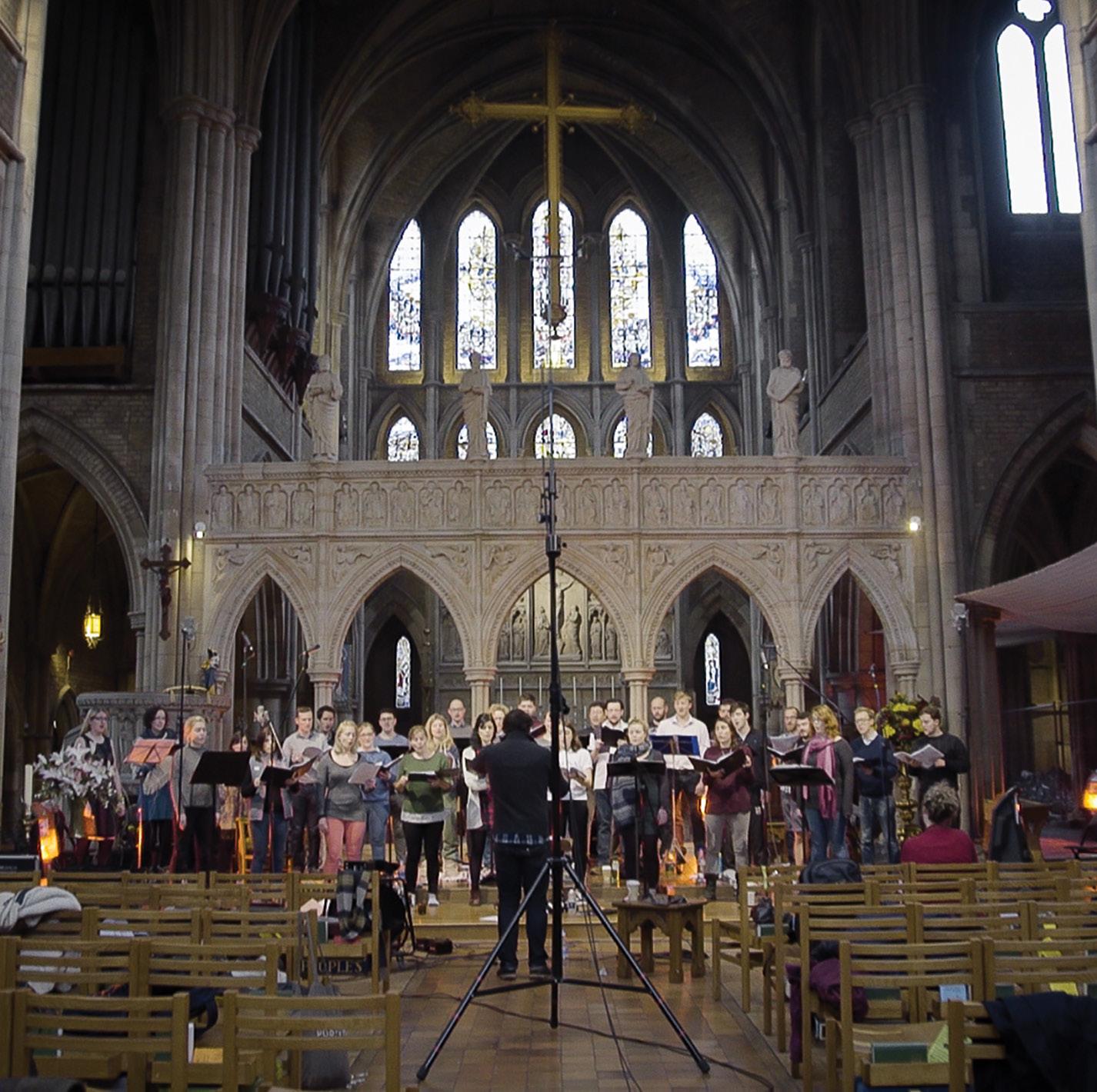DAVID BEDNALL SUDDEN LIGHT
CHORAL WORKS

THE EPIPHONI CONSORT TIM READER


THE EPIPHONI CONSORT TIM READER
THE EPIPHONI CONSORT
TIM READER
Stephen Farr organ *
The Epiphoni Consort and Delphian Records are grateful to Roseanna Brady, Ed Brown, Maggie Bremner,Ann Phillipson, Eve Olsen, Jennie Gardner, John Robb, MorganSimes, MillyTaylor, Joy &Alan Bannister, David & Catherine Oakley, Olwen & Peter Moss, Mr & Mrs Ferrinho and LongWhite Digital for their generous support in sponsoring the productionof this recording. Thanks are also due to the following Friends and benefactorsof the choir: Polly Robb,Stephen & CarolineTaylor and DinahShoults.
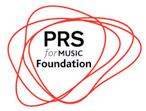
David Bednall is supported by PRS for Music Foundation
Recorded on 28-30 October 2016 at the church of St John the Evangelist, Upper Norwood by kind permission of the Revd John Pritchard, priestin-charge
Producer/Engineer: Paul Baxter
24-bit digital editing: Matthew Swan
24-bit digital mastering: Paul Baxter
Design: Drew Padrutt
Booklet editor: Henry Howard
Cover photography: Brad Ellsworth
Choir Photography © Marc Gascoigne
Delphian Records Ltd – Edinburgh – UK www.delphianrecords.co.uk
Join the Delphian mailing list: www.delphianrecords.co.uk/join
Like us on Facebook: www.facebook.com/delphianrecords
Follow us on Twitter: @delphianrecords
tracksexcept 9, 10, 12 and 17 are premiere recordings
Romantic visions of England emerged during the Great Depression of the 1930s and flowed into the war years in works of art and literature that span the political spectrum, from the early watercolours of Edward Bawden and Brighton aquatints of John Piper to George Orwell’s masterwork of polemical prose The Lion and the Unicorn and Humphrey Jennings’s wartime propaganda films. The revolutionary experiments of high modernism, transnational in style, and the destructive forces of totalitarianism had called English identity into question. What was it? Could it withstand the onslaught of internationalism, rural decline and urban poverty? And would it survive another global conflict? These questions and variations on them have resurfaced in recent years, revealing division at the heart of debates about ‘national character’ and intangible English ‘values’.
There is something in the music of David Bednall that speaks of the English genius, different from – as opposed to better than –that of others; it is present in his harmonic language, in its extended diatonic chords and shimmering polytonal beauty, and there too in the folk-like melodies of many of the works on this recording. The composer shares much in common with the Romantic Moderns of the 1930s and beyond. His art grows from the ground of native tradition, that of the Anglican
cathedral and collegiate choir and its revival in the decades since the First World War; it owes a debt to those who ‘collected’ English folksong, while it was still there to collect; and it connects with the richness of English lyrical poetry. Bednall draws other necessary lessons from the past, for instance in the way his music leads from the particular to the universal. Vaughan Williams, in his 1932 lectures on national music, counselled all young composers to do the same: ‘If the roots of your art are firmly planted in your own soil and that soil has anything individual to give you, you may still gain the whole world and not lose your own souls.’
While echoes of Howells, Finzi and Vaughan Williams belong to the native language of Bednall’s works, his harmonies also harbour traces of Messiaen, Duruflé and Vierne, certain colours and shadings that surface most clearly in his setting of Tota pulchra es. The motet, in common with the composer’s other sacred works, draws deep from the legacy of ancient chant and the ritual language of liturgical texts to find a source of changeless order within a world of constant change. Written to mark Edward de Rivera’s retirement as music director of the Oxford Oratory, Tota pulchra es reflects on the spotless beauty of the Virgin Mary, free from original sin. So much is contained within the opening section’s small space. Its chant-like first soprano melody is
woven into the texture of a complex choral fabric, propelled by lambent suspensions and subtle metrical changes. Jerusalem’s glory, Israel’s joy, find expression in the work’s central fugato, the energy of which gradually diminishes to reveal a hymn stated in fivepart chords. The closing section rests in the reverent simplicity of a solo chant, voiced by soprano above a slow-moving harmonic progression. Te lucis ante terminum has something of Duruflé about it, together with a sense of England’s ancient Christian heritage, the piety of parishioners on the eve of the Reformation and the ‘bare ruin’d choirs’ of the nation’s monastic past. Like Thomas Tallis’s setting of the ancient compline hymn, Bednall’s opens with a statement of the first verse in plainchant, but his approach to the remaining verses differs, presenting the chant as a soprano cantus firmus in the second verse and recycling it as a solo response to an expansive choral variation of the same in the third. The gentle dialogue between choir and solo tenor permeates the work’s closing amens.
Lux orta est iusto was written for and first performed at the 2015 Bristol Proms alongside Tallis’s polyphonic masterwork Spem in alium. Bednall’s forty-part motet, based on lines from Psalm 96 in the Latin Vulgate and the hymn of St Ambrose, Splendor paternae gloriae, pushes the art of the possible with its variety of choral textures and timbres to give dramatic life to
words of joy rooted in the cycle of the liturgy. It pays its debt to Tallis not through imitation of the earlier work’s style but in the scoring for eight SATBarB choirs that both works share. Lux orta est iusto opens with a monumental D major chord, stated in second inversion by eight five-part choirs to the word ‘Lux’ (‘light’), like the sudden appearance of bright sunlight from heavy cloud. The initial phrase surges in block chords towards a polytonal cadence point at ‘est iusto’ and continues its forty-part progress to cadence once more at ‘laetitia’, the word echoed in succession by six, then four choirs. Slabs of sound are interlaced with fleetheeled passages, including a syncopated figure shared between various choirs that drives on to climax at the work’s midpoint. The solemn introspection of ‘lux lucis et fons luminis’, repeated prayer-like as a chordal chant, casts long shadows of ancient ritual over the motet’s central section, which are seen off by brief canonic entries and short contrapuntal duets. Any expectation of the latter’s development is swept aside by the explosive force of a new idea, a swinging ‘Alleluia’ riff, the seed of an extended coda that runs the gamut of dynamic, textural and timbral contrasts.
High Gothic architecture and the consonant sonorities of late fifteenth-century English sacred polyphony come to mind in two of the three movements included here from the Christmas cantata Welcome All Wonders.
Tribus miraculis ornatum celebrates the three miracles of Jesus’s divinity, their memory recalled with near-breathless intensity by choir flecked with light tinges of colour from a pair of sopranos. The excitement of a story undimmed by its endless retellings over the centuries yields to the motet’s central meditation on the Magi travelling to the manger, the wedding at Cana, and Jesus’s baptism in the Jordan, each event recalled with rapt attention and great warmth, the sense of the miraculous heightened with subtle harmonic shifts and textural changes. Complex time signatures surface once again in the final section, restoring the collective ecstasy of the opening and driving it towards a jubilant fourfold ‘Alleluia’.
English verse, like the rich imagery of liturgical texts, clearly belongs to the soil that feeds Bednall’s imagination, the boundless force which Edward Thomas, in a prose meditation on the month of June and the hedgerows of Hampshire, offered as ‘proof that the creature liveth and is divine’. The makings of John Milton’s all-encompassing ethical and spiritual vision of the world are already present in the poet’s first masterwork, On the Morning of Christ’s Nativity, written soon after his twenty-first birthday. But peaceful was the night sets three verses from the Ode’s ‘Hymn’. Here we contemplate the human form of the incarnation, the word made flesh,
to be tested by humanity and, by resisting temptation, restore the ancient bond between God and mankind. The poet’s feeling for the relationship of earth to heaven, of all God’s creation, is mirrored in the composition’s close four-part harmony, its vertical expansion and contraction, its passing dissonances and ringing consonances. The high strength of the hymn’s melodic invention, comparable to that of Vaughan Williams in his Milton setting from the epilogue to Hodie, is magnified in its final verse, where two sopranos articulate the text clear above a wordless accompaniment. Alleluia draws its thematic material from the Prelude for trumpet and organ from Welcome All Wonders, in which it stands as the first great choral acclamation of Jesus’s birth. Bednall subjects the mantra-like repetition of a single word to prolific rhythmic and textural variation, revealing kaleidoscopic perspectives on ‘Alleluia’, open to sudden shifts from ecstasy to reflection and back again.
Sublime love, touched by the divine and eternal yet rooted in life itself, arise in five works inspired by marriage. It also flows through Bednall’s settings of two Shakespeare sonnets and surges like a torrent through Three Songs of Love. The latter deserve to be measured against the finest partsongs of Holst, Parry, Pearsall and Vaughan Williams. The authentic spirit of folk poetry runs through John Clare’s ‘First Love’ (‘I ne’er was struck
before that hour’) and informs Bednall’s sympathetic setting of it; here is a narrative compressed but with all its essential elements displayed as clear as the sudden shock of love descending. Silence finds its natural place in the music’s generous expressive register, briefly present when darkness falls at noon and again as a bridge between the heat of heart’s blood and chill thoughts of rejection. A simple melodic idea supplies the substance of ‘Though you are in your shining days’, its treatment tailored to suit the lyrical ebb and flow of Yeats’s poem, while bell-like chordal sonorities bear both the arching structure and tender sentiment of ‘The Cloths of Heaven’. ‘Then and Now’ sets a sonnet by John McCrae. The Canadian polymath, best known for ‘In Flanders Fields’, began writing poetry at high school. He became a surgeon and soldier, serving during the Boer War and as a medical officer in the First World War. ‘Beneath her window’, posthumously published in 1919, is untouched by war; rather, it speaks of a lifelong love remembered and halfremembered ‘beneath the shadowy eaves’. The anxious pulsing rhythm of the work’s opening permeates the piece until the radiant calm of its close, a gentle chordal coda that swallows the lover’s tears.
The opening quatrain of Shakespeare’s Sonnet 18, Shall I compare thee to a summer’s day?, is so familiar, so embedded in popular
culture, so burdened with the baggage of bardolatry, as apparently to defy musical setting. ‘It is possibly the most loved of all the sonnets, and certainly familiar from many marriage services, yet, nevertheless, remains timeless and fresh on each hearing,’ David Bednall has observed. ‘Added to this of course is the feeling of responsibility involved in setting words of such quality.’ The composer’s setting, guided by the natural stresses and accents of Shakespeare’s prosody, immediately pulls attention to the text, colouring individual words without clouding them. Imitative counterpoint marks an emblematic change from the homophonic opening, pressing the ‘darling buds of May’ to flourish under the heat of summer sun before the seasons change. The final quatrain emerges from a choral unison into radiant multi-part harmony, to signify the beloved’s everlasting beauty and establish the rapt atmosphere of the closing couplet, richly set for double choir.
Sonnet 98, ‘From you have I been absent in the spring’, spins a seductive web of interdependent choral lines, scored for lower voices. The archaic-sounding opening chord, which will also be dropped as a sheet anchor at the setting’s middle and end, dissolves into harmonic ambiguity, vaporous and unsettling, like springtime’s seasonal reminder of renewal and lost youth. Saturn, tutelary spirit of winter and old age, is evoked with dry canonic
counterpoint, stepping aside to allow the poet’s gloom at separation from his beloved to return with a reprise of the opening section. The second bass part’s tenacious ‘Or from this proud lap’ brings instability to the narrative, a bitter reflection absorbed by the second reprise of ‘From you have I been absent’. There is a touch of genius about the heightened ecstasy of the consequent phrase, let loose across two bars of mellifluous polyphony and distilled into the languid contemplation of ‘the deep vermilion of the rose’.
by the first of several pivot-chord modulations which preface an exquisite reckoning of ‘Of balm, of oil, of spice, and ambergris’. The anthem mines simplicity for its song of ‘times trans-shifting’. Herrick’s hope for the life eternal is voiced with ringing clarity and thereafter brought into focus by the work’s closing affirmation.
While the honourable estate of matrimony, God-given according to Cranmer’s Book of Common Prayer, may be in need of some repair as an institution, it remains as a symbol of love and of hope. The intensity of the act of marriage, of what it means for two people to take public vows of commitment, and of the sacred transition it represents, is marked in the sound and spirit of David Bednall’s wedding anthems, pieces that both celebrate one passing moment in time and reflect on its enduring meaning. The poet Robert Herrick’s inventory of material and spiritual riches, emblematic of the ideal marriage, sparks the joyful rhythmic patterning of The Argument of His Book. Herrick’s list invites repetition and receives it in the subtle shifts from the work’s homophonic opening to its contrapuntal treatment of ‘I sing of May-poles’. Repetition’s fair limits are marked by a change of mood and
In Sudden Light Dante Gabriel Rossetti’s words receive a syllabic setting. Its harmonies sound strange yet somehow familiar, as if drawn from Hymns Ancient & Modern yet blurred by passing time to form sonorous new chordal combinations, never quite at rest, always on the brink of resolution before they slip away to seek another modulation or reach an unexpected cadence.
Created as a wedding present for the composer’s sister and her husband, A Wedding Prayer uses lines from a contemporary form of the Anglican marriage service. Its hypnotic harmonies, graced by light dissonances, bring colour and depth to a solo melody that rarely steps beyond an octave’s range, and then only to caress the scale’s ninth degree as symbol of heavenly joy and unconditional love. Rise up, my love, a setting of two verses from the Song of Songs, channels the biblical discourse of love into music that exceeds the expressive power of words, visceral in its impassioned affirmation
of physical and spiritual love. The piece opens with a prelude for organ, restless and urgent. The choir’s opening phrase, voiced in unison octaves and compelling quartal harmonies, unfolds towards a soaring climax and the long road back to repose. Bednall’s response to the words ‘Set me as a seal upon thine heart’ pays tribute to Walton’s famous setting of the same in its use of unaccompanied choir and the piquant flavour of its harmonies; the similarities, however, run only surface deep and are soon dismissed by the recall of the work’s organ introduction, now truncated to serve as a bridge to a return of ‘Rise up, my love,’ marked to be sung ‘with even greater intensity’ than before. Choir and organ, metaphor for two lovers, are brought together at the last to sound chordal echoes above low pedal notes.
Finally, Everyone Sang was written as a wedding blessing, its text taken from Siegfried Sassoon’s ecstatic, near-mystical response to hearing soldiers singing at the First World War’s end. The anthem projects the eruption of joy and hopes for the freedom that peace promises, before holding back almost in disbelief. Descending organ chords allow pause for breath and for luminous beauty to register before the soprano line contemplates a new world. Almost a century after the armistice, with peace still a distant dream for many, the work’s closing bars evoke ancient songs of freedom, always audible over the noise of war.
© 2017 Andrew Stewart
Andrew Stewart has been a freelance writer since 1989. He studied historical musicology at King’s College London, was artistic director of the Southwark Festival, and is an experienced choir trainer and choral conductor.
1 Lux orta est iusto Lux orta est iusto, et rectis corde laetitia.
Psalm 96:11 (Vulgate)
O splendor paternae gloriae, De luce lucem proferens, Lux lucis et fons luminis, Diem dies illuminans. Alleluia.
St Ambrose (c.340–397); Hymn at Lauds on Mondays in ordinary time
Light has arisen for the just man, and gladness for the upright of heart.
O splendour of the father’s light, bringing light out of light, Light of light and source of light, day lightening day. Alleluia.
2 Rise up, my love Rise up, my love, my fair one, and come away. Set me as a seal upon thine heart, as a seal upon thine arm, for love is strong as death.
Song of Solomon 2:10, 8:6 (KJV)
3 Te lucis ante terminum Te lucis ante terminum, Rerum Creator, poscimus, Ut pro tua clementia Sis praesul et custodia.
Procul recedant somnia, Et noctium phantasmata:
Hostemque nostrum comprime, Ne polluantur corpora.
Praesta, Pater piissime, Patrique compar unice,
Cum Spiritu Paraclito, Regnans per omne saeculum. Amen.
Hymn at Compline, with 17th-c. alterations
To you before the ending of the day we pray, Creator of all, that of your mercy you will be our patron and protector.
May dreams and phantasms of night stay far from us: and drive back our enemy that our bodies be not polluted.
Grant this, most loving Father, and only Son equal to the Father, with the Paraclete Spirit reigning for all ages. Amen.
4 First Love
I ne’er was struck before that hour
With love so sudden and so sweet, Her face it bloomed like a sweet flower And stole my heart away complete.
My face turned pale as deadly pale, My legs refused to walk away, And when she looked, what could I ail?
My life and all seemed turned to clay.
And then my blood rushed to my face And took my eyesight quite away, The trees and bushes round the place Seemed midnight at noonday. I could not see a single thing, Words from my eyes did start –They spoke as chords do from the string, And blood burnt round my heart.
Are flowers the winter’s choice?
Is love’s bed always snow?
She seemed to hear my silent voice, Not love’s appeals to know. I never saw so sweet a face As that I stood before.
My heart has left its dwelling-place And can return no more.
John Clare (1793–1864)
Though you are in your shining days & The Cloths of Heaven
5 Though you are in your shining days, Voices among the crowd And new friends busy with your praise, Be not unkind or proud, But think about old friends the most: Time’s bitter flood will rise, Your beauty perish and be lost For all eyes but these eyes.
W. B. Yeats (1865–1939), ‘The Lover Pleads with His Friend for Old Friends’
6 Had I the heavens’ embroidered cloths, Enwrought with golden and silver light, The blue and the dim and the dark cloths Of night and light and the half-light, I would spread the cloths under your feet: But I, being poor, have only my dreams; I have spread my dreams under your feet; Tread softly because you tread on my dreams.
W. B. Yeats, ‘He Wishes for the Cloths of Heaven’
7 Then and Now
Beneath her window in the fragrant night I half forget how truant years have flown Since I looked up to see her chamber-light, Or catch, perchance, her slender shadow thrown Upon the casement; but the nodding leaves Sweep lazily across the unlit pane, And to and fro beneath the shadowy eaves, Like restless birds, the breath of coming rain Creeps, lilac-laden, up the village street When all is still, as if the very trees Were listening for the coming of her feet That come no more; yet, lest I weep, the breeze Sings some forgotten song of those old years Until my heart grows far too glad for tears.
John
McCrae (1872–1918)
8 Shall I compare thee to a summer’s day?
Shall I compare thee to a summer’s day? Thou art more lovely and more temperate. Rough winds do shake the darling buds of May, And summer’s lease hath all too short a date. Sometime too hot the eye of heaven shines, And often is his gold complexion dimmed; And every fair from fair sometime declines, By chance, or nature’s changing course, untrimmed;
But thy eternal summer shall not fade, Nor lose possession of that fair thou ow’st,
Nor shall death brag thou wand’rest in his shade, When in eternal lines to Time thou grow’st. So long as men can breathe, or eyes can see, So long lives this, and this gives life to thee.
William Shakespeare (1564–1616)
9 Tribus miraculis ornatum
Tribus miraculis ornatum, diem sanctum
colimus: hodie stella Magos duxit ad praesepium: hodie vinum ex aqua factum est ad nuptias: hodie in Jordane Christus baptizari voluit, ut salvaret nos.
Magnificat Antiphon for the Feast of Epiphany
Haec est dies illa quam fecit Dominus: exultemus et laetemur in ea. Alleluia.
Psalm 117:24 (Vulgate)
We honour a holy day adorned by three miracles: on this day the star led the Magi to the crib: on this day wine was made out of water at the wedding feast: on this day Christ willed to be baptized in the Jordan that he might save us.
This is that day which the Lord made: let us rejoice and be glad in it. Alleluia.
10 But peaceful was the night
But peaceful was the night Wherein the Prince of Light His reign of peace upon the earth began: The winds with wonder whist, Smoothly the waters kist, Whispering new joys to the mild Ocean, Who now hath quite forgot to rave, While birds of calm sit brooding on the charmed wave.
The Stars with deep amaze Stand fix’d in steadfast gaze, Bending one way their precious influence; And will not take their flight, For all the morning light, Or Lucifer that often warn’d them thence, But in their glimmering orbs did glow, Until their Lord himself bespake, and bid them go.
11 Tota pulchra es
Tota pulchra es, Maria, et macula originalis non est in te. Vestimentum tuum candida quasi nix, et facies tua sicut sol. Tu gloria Jerusalem, tu laetitia Israel, tu honorificentia populi nostril, tu advocata peccatorum. O Maria, virgo prudentissima, Mater clementissima, ora pro nobis. Intercede pro nobis ad Dominum Jesum Christum.
Traditional litany to the BVM based on the psalm antiphons for the Feast of the Immaculate Conception
You are all-beautiful, Mary, and there is no original sin in you. Your robes are white as snow and your face as the sun. You are the glory of Jerusalem, you are the joy of Israel, you are the honour of our people, you are the intercessor for sinners. O Mary, virgin most wise, Mother most merciful, pray for us. Intercede for us to the Lord Jesus Christ.
But see, the Virgin blest Hath laid her Babe to rest: Time is our tedious song should here have ending.
Heav’n’s youngest-teemed star, Hath fix’d her polish’d car, Her sleeping Lord with handmaid lamp attending; And all about the courtly stable, Bright-harness’d Angels sit in order serviceable.
John Milton (1608–1674), from ‘On the Morning of Christ’s Nativity’
12 Everyone Sang
Text by Siegfried Sassoon (1886–1967)
© Barbara Levy Literary Agency
13
Sonnet 98
From you have I been absent in the spring, When proud-pied April dress’d in all his trim Hath put a spirit of youth in every thing, That heavy Saturn laugh’d and leap’d with him. Yet nor the lays of birds nor the sweet smell Of different flowers in odour and in hue Could make me any summer’s story tell, Or from their proud lap pluck them where they grew; Nor did I wonder at the lily’s white, Nor praise the deep vermilion in the rose; They were but sweet, but figures of delight, Drawn after you, you pattern of all those. Yet seem’d it winter still, and, you away, As with your shadow I with these did play.
William Shakespeare
Blessed are you, O Lord our God, for you have created joy and gladness, pleasure and delight, love and peace. Pour out the abundance of your blessing upon your servants. Let their love for each other be a seal upon their hearts, and a crown upon their heads. Bless them in joy and in sorrow, in life and in death. Finally, in your mercy, bring them to that banquet where your saints feast for ever in your heavenly home. Amen.
From a form of prayer for the blessing of marriage in Common Worship: Pastoral Services © The Archbishops’ Council
15 Sudden Light
I have been here before, But when or how I cannot tell: I know the grass beyond the door, The sweet keen smell, The sighing sound, the lights around the shore.
You have been mine before, –How long ago I may not know: But just when at that swallow’s soar Your neck turn’d so, Some veil did fall, – I knew it all of yore.
Has this been thus before?
And shall not thus time’s eddying flight
Still with our lives our love restore In death’s despite, And day and night yield one delight once more?
Dante Gabriel Rossetti (1828–1882)
16 The Argument of His Book
I sing of brooks, of blossoms, birds, and bowers,
Of April, May, of June, and July flowers. I sing of May-poles, hock-carts, wassails, wakes, Of bridegrooms, brides, and of their bridalcakes.
I write of youth, of love, and have access By these to sing of cleanly wantonness. I sing of dews, of rains, and piece by piece Of balm, of oil, of spice, and ambergris.
I sing of times trans-shifting; and I write How roses first came red, and lilies white. I write of groves, of twilights, and I sing The court of Mab, and of the fairy king. I write of Hell; I sing (and ever shall)
Of Heaven, and hope to have it after all.
Robert Herrick (1591–1674)
17 Alleluia
Alleluia
Since its founding in 2014, The Epiphoni Consort has rapidly developed a reputation for creative programming and accomplished, nuanced performances, as well as a commitment to the music of living composers. The choir was set up to bring together singers who have advanced vocal and choral training but other primary careers. In 2015, The Epiphoni Consort was winner of Tenebrae’s Locus Iste Competition, and runner-up in the 2015 London International A Cappella Choir Competition, where a judging panel described its performance as ‘mesmerising’ with ‘excellent interpretation and atmosphere’.
Under Tim Reader's direction,The Epiphoni Consort has performed the St Paul’s Service by Herbert Howells at St Paul’s Cathedral, the All-Night Vigil by Rachmaninov at St Martin-inthe-Fields, and Spem in Alium by Thomas Tallis for Sir Terry Pratchett’s memorial at the Barbican – the author’s favourite piece of music. In November 2015, following its competition win, the world-renowned ensemble Tenebrae invited The Epiphoni Consort to join them on stage at St James’, Spanish Place. The choir made its first TV appearance in 2016, taking part in a BBC4 documentary, The Joy of Rachmaninov and again in 2017 on BBC2 for the documentary Terry Pratchett: Back In Black.
Sudden Light is The Epiphoni Consort’s debut recording.
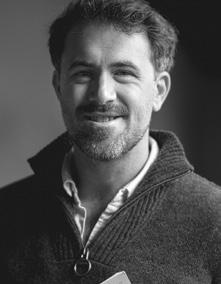
Tim Reader, artistic director of the Epiphoni Consort, studied singing, accompanying and conducting at the University of Exeter and now juggles two quite contrasting careers – one in digital consultancy for arts, culture and heritage charities, and the other as a choral director in London and surrounding areas.
He is a member of the Sunday morning choir, comprising eight professional singers, at St John’s Wood Church.

Stephen Farr’s career as a soloist and ensemble player has taken him throughout Europe, North and South America, and to Australia. He held appointments at Christ Church, Oxford, and Winchester and Guildford Cathedrals before pursuing a freelance career. He has played with many of the world’s leading ensembles, and has appeared in major venues including the Berlin Philharmonie, the Royal Festival Hall, and the
Royal Albert Hall, where he has appeared at the BBC Proms as both harpsichordist and organist, including a solo recital in the 2011 season and a concerto in the 2015 season. He is Director of Music at St Paul’s Church, Knightsbridge and teaches organ at both Oxford and Cambridge Universities. He was Organ Scholar of Clare College, Cambridge, obtaining a double first in Music and an MPhil in Musicology; he also holds a PhD from the University of Surrey. His extensive and wideranging solo discography encompasses music from the sixteenth to the twenty-first century.
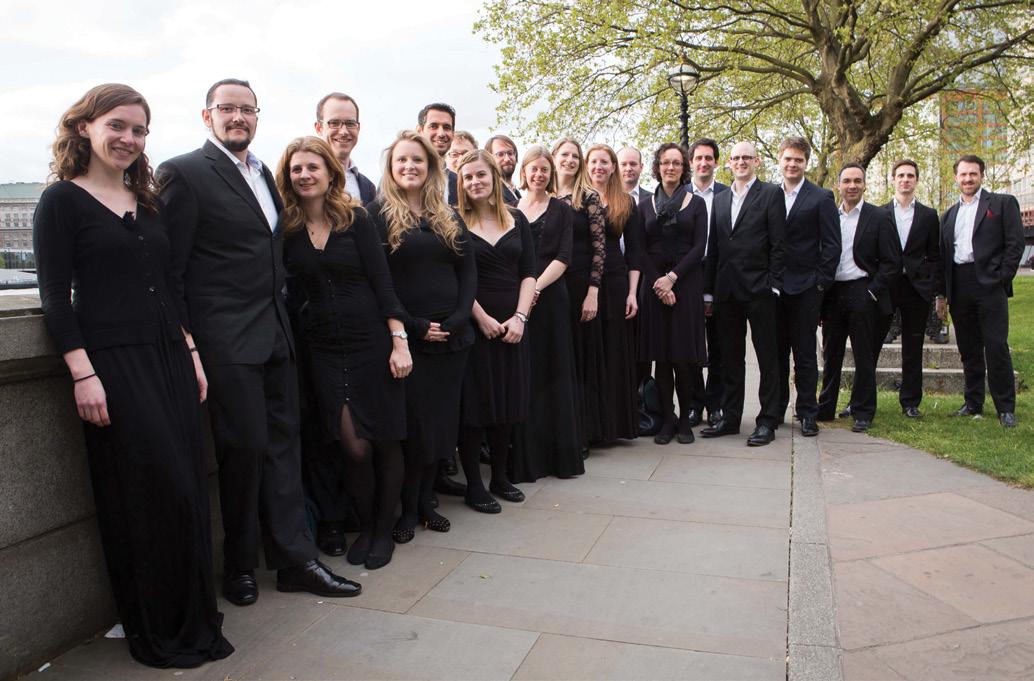
Sopranos
Cathy Al Ghabra
Claire Clarke*
Emma Morgan*
Harriet Flower*
Harriet Pridmore
Helen May*
Jenny Forsyth
Milly Taylor*
Rachel Caccia
Altos
Cecily Beer
Charly Oakley
Christina Astin
Helen Hendry*
Jenny McPherson*
Jessica Haig
Laura Bevan*
Leonora DawsonBowling
Tom Day* Tenors
Chris Pelmore*
Gareth Moss
John Robb*
Matthew Pochin
Rich Holdsworth
Will Searle
Basses
Adrian Collister*
Charles Blamire-Brown*
Ed Bremner
Jon Bannister
Matthew Shoults
Milo Comerford*
Morgan Simes*
Nico Ferrinho
Additional singers for track 1:
Sophie Cleobury, Rosamund Ford sopranos
Emma Kjellin alto
Jonathan Mayes, Joel Potts, Mark Williams* tenors
Barnaby Beer, Peter Deane, Tim Handel, Drew Hope, Paul Kiang, Richard Pelmore,
Alex Roose, Geoff Williams, Graham Wood basses
*choir in track 8
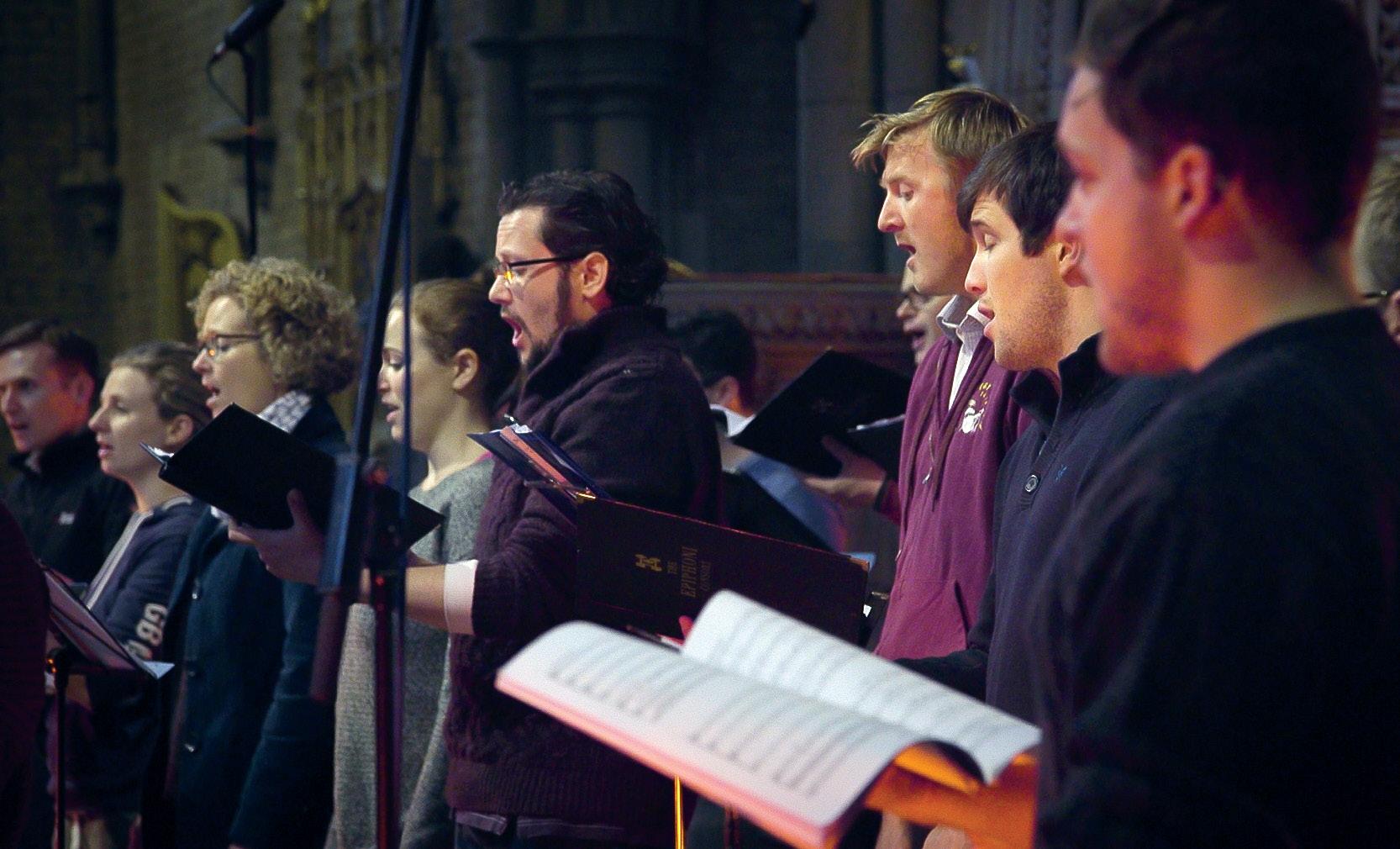

As one of the rising stars in the world of period Bojan Čičić is fast making a name for himself with his sensitive and virtuosic playing. In addition to being the leader of Florilegium, he frequently guest directed groups such as the Academy of Ancient Music, European Union Baroque Orchestra, and Camerata Kilkenny. His recording of J. S. Bach’s Concerto for two violins with Rachel Podger and Brecon Baroque was recently named ‘best available recording’ by BBC Music Magazine.
Viri Galilaei: Favourite Anthems from Merton Choir of Merton College, Oxford / Benjamin Nicholas & Peter Phillips
DCD34174
Bojan plays a violin by Rugieri from the 1680s, kindly loaned to him by the Jumpstart Junior Foundation.
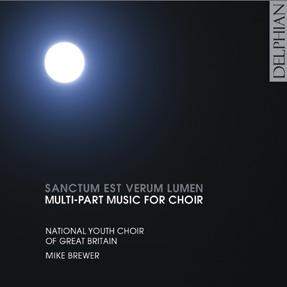
the Antwerp Laus Polyphoniae Festival with a programme of sixteenth and seventeenthcentury Adriatic music, and has also toured Holland and Belgium extensively, performing Baroque music from Vienna and Venice.
Now firmly established among Oxbridge’s finest choral foundations and at the same time certainly its youngest, the Choir of Merton College can be relied upon to present a selection of favourite anthems which similarly combines fresh inspiration with timeless musical values. The choir’s fifth Delphian recording in five years again showcases the talents of its joint directors Benjamin Nicholas and Peter Phillips, with Phillips’ love of polyphony complemented by Nicholas’s flair and commitment in some of the twentieth century’s major choral works. Bookending these ‘favourites’ are Patrick Gowers’ now iconic Ascension Day anthem Viri Galilaei and Jonathan Dove’s newly minted Te Deum, commissioned by Merton College as part of the Merton Choirbook – the largest series of commissions of its kind in modern times, created in celebration of the College’s 750th anniversary.
Bojan Čičić founded The Illyria Consort, formerly known as Suonar Cantando, to explore rare repertoire of the seventeenth and eighteenth centuries. The group has recently appeared at the Korkyra Baroque Festival and
In 2014, The Illyria Consort presented ‘Treasures of the Monastery’ at the Utrecht Early Music Festival, performing violin sonatas kept in manuscript form in the library of the Minorite monastery in Vienna. In January 2015, the group travelled to Ghent to present a programme entitled ‘Sounds of Imperial Vienna’.
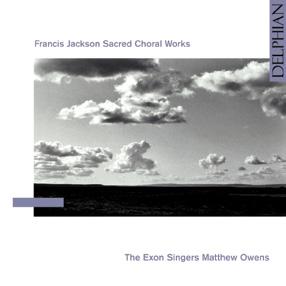
Francis Jackson: Sacred Choral Works
The Exon Singers / Matthew Owens
David Bednall organ
DCD34035
Now in his nineties, Francis Jackson remains one of the finest, best-loved and most versatile church musicians of our age. The eleven works on this disc, none of them previously recorded, have all the colour, emotional depth and attention to structural detail that are consistent hallmarks of his style. Working closely with the composer, The Exon Singers bring their customary blend of virtuosity, intense commitment and subtle responsiveness to this portrait in sound of a very special composer.
‘With Matthew Owens’ affectionate readings and The Exon Singers’ beautifully tailored singing, not to mention a richly atmospheric recording from Wells Cathedral, this presents as touching and rewarding a compendium of very English 20th-century church music as one could wish for’ — Gramophone, December 2006
‘captivating … deliciously expansive … The choir’s singing is notable for its clarity, and [Nicholas and Phillips] bring to these performances a warm-hearted fondness which is as indefinable as it is apparent’ — Gramophone, April 2016
In the summer of 2015, The Illyria Consort performed Vivaldi: L’Estro Armonico at the Festival de Sablé, while this year they appeared at the Rutland Music Festival, performing violin sonatas by Carbonelli.
Sanctum est verum lumen: multi-part choral works
National Youth Choir of Great Britain / Mike Brewer
DCD34045
Tallis’s monumental Spem in alium is one of the greatest glories of Western polyphony, and its pre-echoes and aftershocks reverberate through all the other pieces on this disc.The NationalYouth Choir of Great Britain’s massed voices shed dazzling light on its programme of polychoral works from the fifteenth and sixteenth centuries, interspersed with virtuoso tributes from three leading contemporary composers including Gabriel Jackson’s own towering 40-part motet Sanctum est verum lumen
‘the young voices of the National Youth Choir make properly massive impact’ — The SundayTimes, October 2008
‘There’s nothing austere or tranquil about the singing here: God is being praised, not feared, by these glorious performers’ — Classic FM Magazine, December 2008


Judith Weir: Choral Music
Choir of Gonville & Caius College, Cambridge / Geoffrey Webber
DCD34095
This first recording devoted entirely to Judith Weir’s choral music comprises her complete works to date for unaccompanied choir or choir with one instrument (trombone and marimba as well as the more usual organ). Tracking her evolving relationship with the medium from her earliest liturgical commission to the most recent, premiered in 2009, it also includes several secular pieces and her two solo organ works, which are now established classics of the repertoire. The athleticism, intensity and clarity that mark out Geoffrey Webber’s choir are ideally suited to Weir’s strikingly original, approachable and fascinating music.
‘Delphian’s recording is ideal, with the resonance never drowning the detail … The singing of Geoffrey Webber’s choir is faultless’ — The Arts Desk, October 2011

As one of the rising stars in the world of period Bojan Čičić is fast making a name for himself with his sensitive and virtuosic playing. In addition to being the leader of Florilegium, he frequently guest directed groups such as the Academy of Ancient Music, European Union Baroque Orchestra, and Camerata Kilkenny. His recording of J. S. Bach’s Concerto for two violins with Rachel Podger and Brecon Baroque was recently named ‘best available recording’ by BBC Music Magazine.
Drop down, ye heavens: Advent antiphons for choir & saxophone
Siglo de Oro / Patrick Allies; Sam Corkin DCD34184
the Antwerp Laus Polyphoniae Festival with a programme of sixteenth and seventeenthcentury Adriatic music, and has also toured Holland and Belgium extensively, performing Baroque music from Vienna and Venice.
Bojan plays a violin by Rugieri from the 1680s, kindly loaned to him by the Jumpstart Junior Foundation.
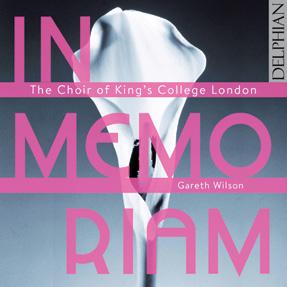

Siglo de Oro’s first commercial recording sees the choir and its director Patrick Allies in collaboration with saxophonist Sam Corkin.Their intriguing programme highlights the saxophone’s natural kinship with the human voice, as well as the endless expressive possibilities which this versatile instrument stimulates in the imaginations of modern composers. Its athletic vigour launches WillTodd’s O Wisdom, the first of eight settings of the Advent antiphons in English which, having been commissioned by the present artists, now form the backbone of this recording. Elsewhere the instrument soars above the voices’ urgent prophecy and imploration, while the choir is heard unaccompanied in glowing renditions of sixteenth-century polyphony – works by Pierre Certon, Antoine de Mornable, Michael Praetorius and Josquin des Prez, whose music complements the atmosphere of quiet expectancy proper to Advent.
In 2014, The Illyria Consort presented ‘Treasures of the Monastery’ at the Utrecht Early Music Festival, performing violin sonatas kept in manuscript form in the library of the Minorite monastery in Vienna. In January 2015, the group travelled to Ghent to present a programme entitled ‘Sounds of Imperial Vienna’.
‘A debut with a difference … A novel, ungimmicky project, vividly executed’ — BBC Music Magazine, December 2016
Bojan Čičić founded The Illyria Consort, formerly known as Suonar Cantando, to explore rare repertoire of the seventeenth and eighteenth centuries. The group has recently appeared at the Korkyra Baroque Festival and
In Memoriam
In the summer of 2015, The Illyria Consort performed Vivaldi: L’Estro Armonico at the Festival de Sablé, while this year they appeared at the Rutland Music Festival, performing violin sonatas by Carbonelli.
The Choir of King’s College London / Gareth Wilson DCD34146
The choir which David Trendell directed for twenty-two years pays tribute in a collection of specially chosen pieces by David’s colleagues, friends and former students, interspersed with the Renaissance polyphony which was Trendell’s area of scholarly expertise. His deep love for the Song of Songs has inspired many of the inclusions, and its nature imagery threads through the disc, adding a suggestion of renewal and rebirth to the memorial tone of works written in the difficult months after his untimely death. The composers’ affection for David and gratitude for his life and musical achievements is matched by the intelligence and deep musicality of the choir which he raised to an international reputation, and which here takes on a sophisticated and challenging programme in his memory.
‘The choir sings with assured intonation and a controlled vibrancy … For quality of performance and diversity of repertoire, this is an outstanding disc’ — Choir & Organ, March/April 2016, *****
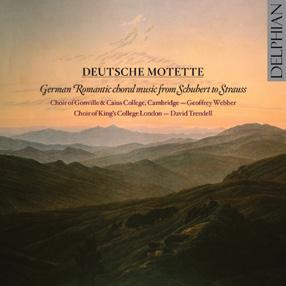
Deutsche Motette
The Choirs of Gonville & Caius College, Cambridge and of King’s College London / Geoffrey Webber & David Trendell DCD34124
Delphian’s superchoir reunites after its highly successful recording of Rodion Shchedrin’s The Sealed Angel (Delphian DCD34067), this time for a unique programme of German music from Schubert to Richard Strauss. Strauss’s sumptuous Deutsche Motette is the last word in late Romantic choral opulence, its teeming polyphony brought to thrilling life by this virtuoso cast of over sixty singers.The rest of the programme explores the vivid colours and shadowy half-lights of a distinctly German music that reached its culmination in Strauss’s extravagant masterpiece.The singing throughout combines a musical intensity and imagination with an understanding of period style, two qualities that are hallmarks of both choirs’ work.
‘Credit to conductor David Trendell for eliciting that sustained intensity of expression from his combined college choirs, whose youthful timbre imparts a freshness which … suits the imprecatory nature of Rückert’s poem perfectly’ — BBC Music Magazine
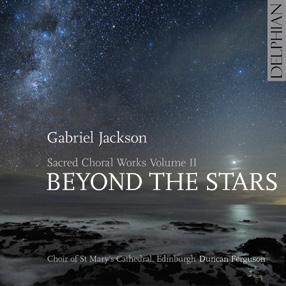

Gabriel Jackson: Beyond the Stars (Sacred Choral Works Vol II) Choir of St Mary’s Cathedral, Edinburgh / Duncan Ferguson
DCD34106
Celebrating his fiftieth birthday in 2012, Gabriel Jackson has had a long and close association with the Choir of St Mary’s Cathedral. This is the choir’s second disc of Jackson’s choral music on Delphian, and under Duncan Ferguson’s dynamic direction they bring a special authority, and all their characteristic verve and intensity, to a sequence of recording premieres centred on the florid Hymn to St Margaret of Scotland, newly written for the choir. This sumptuously recorded disc opens a window on the luminous sound-world of one of Britain’s finest choral composers.
‘It's easy to get so wrapped up in the ravishing delights of Jackson's writing that you forget the astonishing quality of these performances’ — Gramophone, October 2012, EDITOR’S CHOICE
